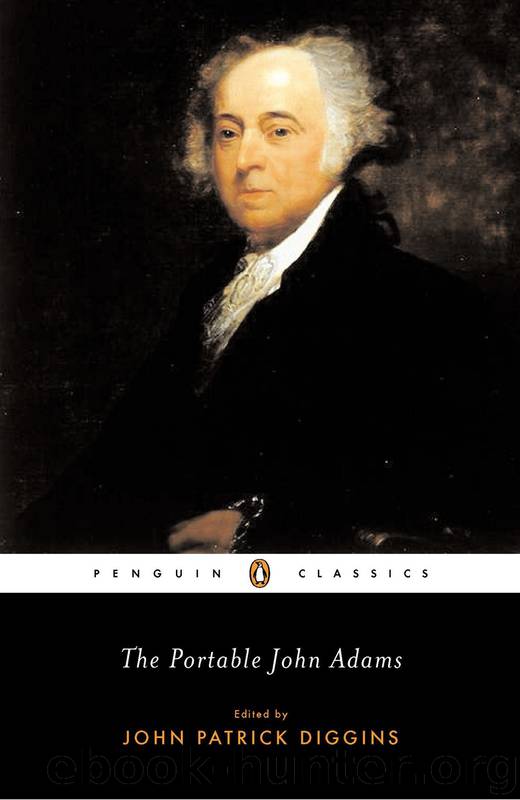The Portable John Adams by John Adams

Author:John Adams [Adams, John]
Language: eng
Format: epub
Tags: Classics, Biography & Autobiography, General, History, Presidents & Heads of State, United States
ISBN: 9780142437780
Publisher: Penguin
Published: 2004-06-29T05:00:00+00:00
No. VIII.
It has often been observed by me, and it cannot be too often repeated, that colonization is casus omissus at common law. There is no such title known in that law. By common law, I mean that system of customs written and unwritten, which was known and in force in England in the time of King Richard I. This continued to be the case down to the reign of Elizabeth and King James I. In all that time, the laws of England were confined to the realm, and within the four seas. There was no provision made in this law for governing colonies beyond the Atlantic, or beyond the four seas, by authority of parliament; no, nor for the king to grant charters to subjects to settle in foreign countries. It was the king’s prerogative to prohibit the emigration of any of his subjects, by issuing his writ ne exeat regno.3 And, therefore, it was in the king’s power to permit his subjects to leave the kingdom. “It is a high crime to disobey the king’s lawful commands or prohibitions, as not returning from beyond sea upon the king’s letters to that purpose; for which the offender’s lands shall be seized until he return; and when he does return, he shall be fined, &c.; or going beyond sea against the king’s will, expressly signified, either by the writ ne exeat regno, or under the great or privy seal, or signet, or by proclamation.” bg When a subject left the kingdom by the king’s permission, and if the nation did not remonstrate against it, by the nation’s permission too, at least connivance, he carried with him, as a man, all the rights of nature. His allegiance bound him to the king, and entitled him to protection. But how? Not in France; the King of England was not bound to protect him in France. Nor in America. Nor in the dominions of Louis. Nor of Sassacus, or Massachusetts. He had a right to protection and the liberties of England, upon his return there, not otherwise. How, then, do we New Englandmen derive our laws? I say, not from parliament, not from common law, but from the law of nature, and the compact made with the king in our charters. Our ancestors were entitled to the common law of England when they emigrated, that is, to just so much of it as they pleased to adopt, and no more. They were not bound or obliged to submit to it, unless they chose it. By a positive principle of the common law they were bound, let them be in what part of the world they would, to do nothing against the allegiance of the king. But no kind of provision was ever made by common law for punishing or trying any man, even for treason committed out of the realm. He must be tried in some county of the realm by that law, the county where the overt act was done, or he could not be tried at all.
Download
This site does not store any files on its server. We only index and link to content provided by other sites. Please contact the content providers to delete copyright contents if any and email us, we'll remove relevant links or contents immediately.
| U.K. Prime Ministers | U.S. Presidents |
Waking Up in Heaven: A True Story of Brokenness, Heaven, and Life Again by McVea Crystal & Tresniowski Alex(37031)
Empire of the Sikhs by Patwant Singh(22201)
We're Going to Need More Wine by Gabrielle Union(18100)
Hans Sturm: A Soldier's Odyssey on the Eastern Front by Gordon Williamson(16979)
Leonardo da Vinci by Walter Isaacson(11944)
The Radium Girls by Kate Moore(10939)
Educated by Tara Westover(7093)
Tools of Titans by Timothy Ferriss(6993)
How to Be a Bawse: A Guide to Conquering Life by Lilly Singh(6720)
The Last Black Unicorn by Tiffany Haddish(5091)
Permanent Record by Edward Snowden(5025)
The Rise and Fall of Senator Joe McCarthy by James Cross Giblin(4857)
Promise Me, Dad by Joe Biden(4467)
The Wind in My Hair by Masih Alinejad(4437)
The Crown by Robert Lacey(4125)
A Higher Loyalty: Truth, Lies, and Leadership by James Comey(4051)
The Iron Duke by The Iron Duke(3663)
Joan of Arc by Mary Gordon(3280)
How to be Champion: My Autobiography by Sarah Millican(3202)
